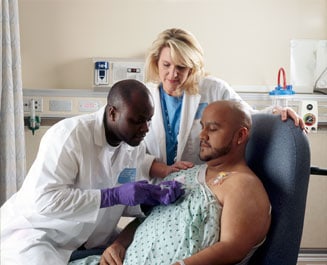Going Through Chemotherapy
Schedule for chemotherapy
Your chemotherapy schedule depends on the drugs and combinations of drugs in your treatment plan.
Chemotherapy is often given in cycles, with days or weeks off between treatments. This cycling gives your body a chance to recover between treatments.
A full course of chemotherapy for early or locally advanced breast cancer is usually given over 3-6 months.
Ask for a list of your upcoming chemotherapy visits so you can plan ahead and add them to your calendar.
How chemotherapy drugs are given
Most chemotherapy drugs for breast cancer are given through an IV into a vein in an outpatient setting at a hospital or clinic. Often, a combination of 2 or 3 chemotherapy drugs is used.
At each visit, an IV is inserted into your arm, allowing the drugs to drip into the bloodstream.
A few chemotherapy drugs are pills.
Port-a-cath (port, mediport)
Some people have a surgical procedure to insert a small device called a port-a-cath under the skin of the chest. This may be called a port or a mediport. One end of the port goes into a large vein near your heart and the other end is just under your skin.
Chemotherapy drugs can be given through the port. This avoids starting an IV in your arm at each visit. Instead, a needle is inserted through your skin to the port. Then, the needle is connected to an IV line with the chemotherapy.
The port remains in place until your chemotherapy treatment is completed. Talk with your health care provider about when the port can be removed.
The picture below shows a person getting chemotherapy through a port.
|
Source: National Cancer Institute (www.cancer.gov) |
What to expect at each chemotherapy visit
Each chemotherapy visit lasts 1-6 hours. This includes time with your medical and nursing teams.
At each visit, your blood counts will be checked.
You may be given anti-nausea medications and other treatments to reduce some side effects. You usually take these medications before your chemotherapy session begins.
A friend or family member may be able to stay with you during the visit. You may also choose to read, listen to music, watch TV or sleep.
Before you begin chemotherapy, talk with your health care provider about the possible side effects you may have and whether you need to have someone drive you home after each visit. Your provider may give you a handout or a binder with this information. You may find it helpful to take notes in a notebook or on your phone or tablet.
Learn more about things to consider before chemotherapy begins.
Learn about short-term side effects of chemotherapy.
Learn about long-term side effects of chemotherapy.
Transportation, lodging, childcare and eldercare assistance
If you don’t live near the treatment center, it can be hard to get to and from chemotherapy sessions. It’s OK to ask for help.
There may be resources available if you need a ride to and from treatment or help with childcare or eldercare. Family and friends often want to help but don’t know how. These are great ways for them to get involved.
There may be some programs that help with local or long-distance transportation and lodging (if you need a place to stay overnight during treatment).
There may also be programs to help you with childcare or eldercare costs.
Learn more about transportation, lodging, childcare and eldercare assistance programs.
Find other resources that offer social support and practical support.
Komen Financial Assistance Program |
Susan G. Komen® created the Komen Financial Assistance Program to help those struggling with the costs of breast cancer treatment by providing financial assistance to eligible individuals. To learn more about this program and other helpful resources, call the Komen Breast Care Helpline at 1-877 GO KOMEN (1-877-465-6636) or email helpline@komen.org. Se habla español. |
Susan G. Komen® Support Resources |
|
Updated 04/07/24


